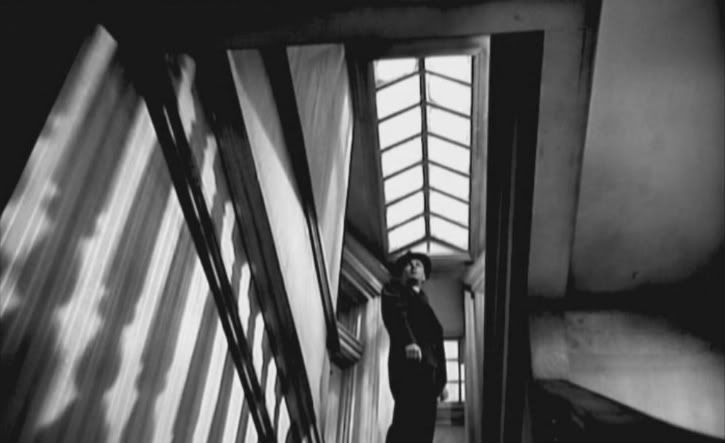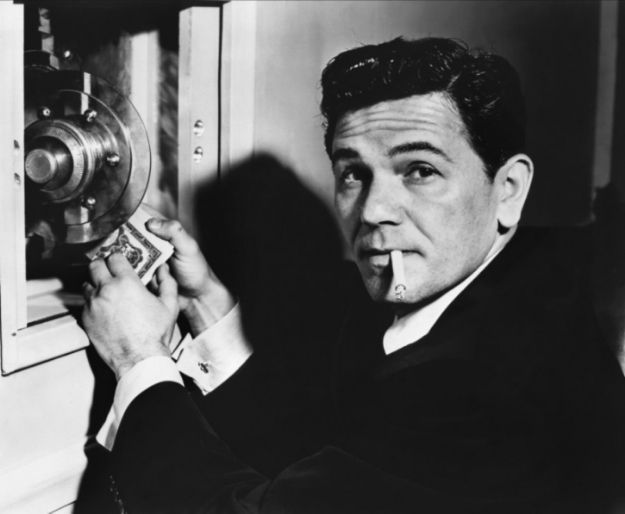
This is my reaction paper from a college film noir class. Originally written in 2003.
Spoiler...
In “Force of Evil,” (1948) the protagonist, Joe Morse (John Garfield), is an over- idealistic criminal. He really seems to believe that everything is going to be okay in the end. He even thinks that the illegal activities he gets sucked into will only be illegal temporarily. In fact, Joe is so confident, he tries to convince and eventually forces his brother Leo into the business. The strange part is that Leo runs an illegal gambling bank, but doesn’t seem to be involved in the underworld. Somehow, Leo has managed to stay immune to such things. If he was smart, Joe would take a lesson from Leo, but Joe believes he can get rich quick and does not have to work hard for his whole life like Leo. Throughout the movie, it seems as though Leo doesn’t really like his brother. When Joe bails Leo out of jail, Leo says to Joe, “All that Cain did to Abel is murder him.” In other words, Leo is saying that Joe is a worse brother than Cain. However, later in the movie when Mr. Bauer betrays everyone, because he is deeply afraid of the mob, Leo tells him, “I’ll kill you with my own hands rather than let you put the mark of Cain on my brother.” This means that Leo feels like Joe may be wrong, but he’s still his brother, and no one is going to do him wrong, no matter what.
There is a romantic subplot: Joe falls for Doris Lowry, Leo’s secretary, who is like a daughter to Leo. The interesting thing about the romance, is that Leo always warned Doris about his brother and told her that he was no good. However, instead of making Doris cautious of Joe, this seemed to backfire and actually endear him to her. Doris was unable to resist the “bad boy,” the idea of whom she had already fallen in love with even before they met. Somehow, she seemed to have gotten it into her mind that she could change Joe and make him a good person. She might have even thought that it was the perfect way to make up the great debt she felt she owed Leo. A line that Joe says in the middle of the film sums it up well: “I think she made up her mind to fall in love with me.”
This film had two scenes that were just classic noir. The first scene is when Joe goes into his office and sees that a light is on. The only light in the scene is from the office and the use of shadows is great. Joe quietly stands on a chair and looks into his office though a window on top of his doorway. (What ever happened to windows on top of doorways? They just aren’t popular anymore.) He sees a cop tapping the phone he keeps locked in a drawer. A detail, I thought was a little over the top. I understand that it is hidden because it’s a direct line to his mobster boss, but come on, who locks a phone in a drawer? The second scene is when Joe realizes that he has been defeated. He goes out of his office and thinks to himself that he’ll never see this place again. Then he walks in the middle of a downtown Manhattan street, except there are no cars or people anywhere. This clearly represents how alone Joe feels even in a city.
The gangster side of the movie was interesting. You can see that the makers of modern gangster movies were heavily influenced by this movie. For instance one of Ficco’s henchman delivers a line that could have been right out of any modern gangster movie: “What do you mean gangsters? It’s business.” Also, later on in the movie, Mr. Bauer lures Leo to an Italian restaurant where they are both murdered by gangsters. Sounds like the "The Godfather," doesn't it?
This movie definitely has some flaws. For instance, I don’t understand the mobster’s plan to make gambling legal or why that many people would bet on a horse with the number 776, even if it was the fourth of July. Also, there is no point to the character Edna Tucker. Were all of her scenes cut? She does wear a cool spider woman outfit that would be perfect for some sort of femme fatale. However, her character must have been seducing men in some other movie, because it wasn’t in this one.
I really enjoyed Joe’s cynicism when he realizes he’s done for. He says to Doris, “A holiday is when you celebrate something that ended long ago.” “When did your life end,” Doris asks him? “The day I was born,” Joe replies.
The final scene in the movie where Joe runs down hundreds and hundreds of steps so that he can see for himself whether his brother is really dead, was also very powerful. Especially with the narration, “It was like going down to the bottom of the world to find my brother. He was dead and I felt like I killed him.”

No comments:
Post a Comment